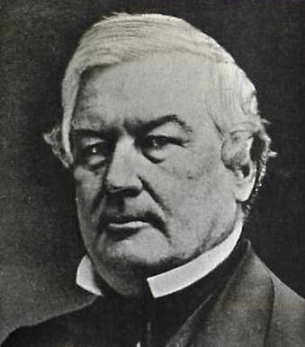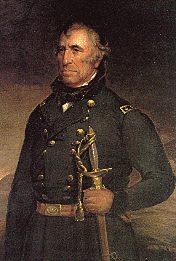 MILLARD
FILLMORE
MILLARD
FILLMOREwww.FranzosenbuschHeritageProject.org Home
 MILLARD
FILLMORE
MILLARD
FILLMORE
13TH PRESIDENT OF THE UNITED STATES
1850-1853
FILLMORE, MILLARD (1800-74), 13th President of the United States (1850-53). Born in Locke, N.Y., he had little formal schooling, but he read law in his spare time and was admitted to the bar in 1823, He opened his own law office and became active in politics. Under the patronage of Thurlow Weed, the leader of the Anti-Masonic party, Fillmore was elected to the New York state legislature (1828) and to the U.S. House of Representatives (1833). Later he followed Weed into the Whig party and, as a Whig, served three consecutive terms in Congress (1837-43). He belonged to the Whig faction led by Henry Clay, though he maintained an independent attitude on several issues. As chairman of the House Ways and Means Committee (1840), he was chiefly responsible for the high protective tariff passed in 1842.
Fillmore failed to secure the vice presidential nomination in 1844 and became the Whig candidate for Governor of New York. Unsuccessful because of a party split over the slavery issue, he attributed his defeat to the "Abolitionists and foreign Catholics." Three years later he was elected New York state comptroller. His staunch support of Henry Clay helped gain him the Whig nomination for Vice President (1848) on the ticket with Zachary Taylor. Elected, he succeeded to the presidency in 1850 upon Taylor's death.
 Zachary
Taylor, 12th President of the United States of America
Zachary
Taylor, 12th President of the United States of America
The new President believed in upholding a middle-of-the-road policy, a course he had consistently pursued while presiding over the Senate as Vice President. He was a persistent advocate of compromise in closing the widening gap between North and South. His principal domestic chievement was the Compromise of 1850. The leading feature of this controversial legislation was the Fugitive Slave Law, which required the return of escaped Negro slaves to their owners. Unmoved by the harsh criticism of the abolitionists, Fillmore spared no effort in enforcing the unpopular law. But bitter feelings about the measure helped destroy the Whigs as a powerful national party.
During Ffflmore's administration Matthew C, Perry was selected to negotiate a treaty opening Japan to American trade. When Perry sailed in 1852 he carried with him a letter from President Fillmore to the Emperor of Japan containing proposals for an agreement. The success of Perry's mission proved to be one of the most significant diplomatic developments of the 19th century.
At the Whig convention in 1852 Fillmore had the cordial support of the Southern Whigs, but he was unable to muster enough backing among the Northerners. The nomination went to Gen. Winfield Scott, an avowed enemy of slavery. Fillmore abandoned the disintegrating Whig party for the American, or Know-Nothing, party, hoping thereby to save the Union. In 1856 he accepted its nomination for the presidency, and in his campaign he stressed the value of moderation and the dangers of sectionalism. He ran a poor third in the election, winning but one state. Retiring from active politics, he retained a keen interest in the issues of the day and devoted himself to many educational and civic enterprises. He opposed
Abraham Lincoln's administration in its conduct of the Civil War and supported the Reconstruction policy of President Andrew Johnson.
Fillmore was a large man who made an impressive platform appearance. His personal manner was gracious and kindly. Though not an outstanding President, his honesty and integrity were unquestioned. He was married twice His first wife, Abigail Powers, died in 1853, and five years later he married a widow, Mrs. Caroline Mclntosh.
Consult Payback, R. J., Millard Fillmore: Biography of a President (1959).
JAMES P. SHENTON, Columbia University
For the history of our local settlers, see Early Settler History (1833 - 1850).
Source: Encyclopedia International, Grolier International, 1972.
Pictures from the Encyclopedia International, Grolier International, 1972.
Last Modified: 04/11/2003